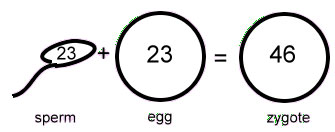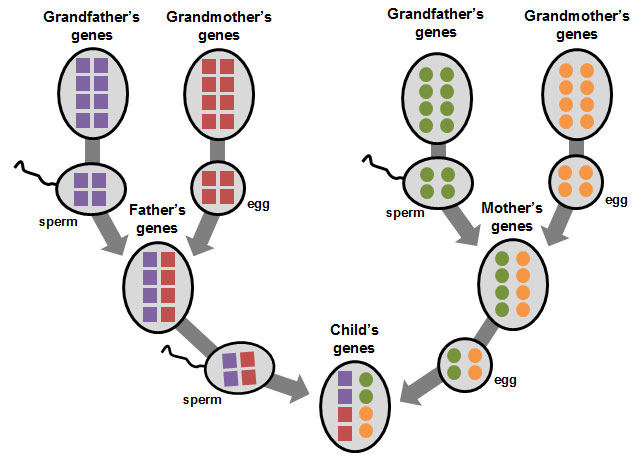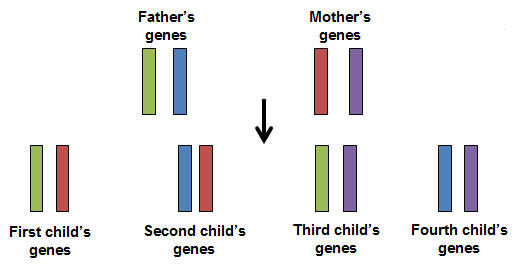Sexual reproduction produces offspring by combining the genetic material of two parents. Most animals reproduce by means of sexual reproduction.
![]() Watch this video for a brief overview of sexual reproduction.
Watch this video for a brief overview of sexual reproduction.
Source: Sexual Reproduction, Mark Drollinger, YouTube
In the video, you learned that sexual reproduction involves the joining of a male and female sex cell. Sex cells are also called gametes. The male gamete is sperm, and the female sex cell is an egg. Each sex cell contains 50 percent of the parent’s genes. The chart shows the number of pairs of chromosomes and a total number of chromosomes found in various organisms.
Organisms |
Pairs of Chromosomes |
Total number of Chromosomes |
|
 |
Pea Plant | 7 |
14 |
 |
Sun Flower | 17 |
34 |
 |
Cat | 19 |
38 |
 |
Puffer Fish | 21 |
42 |
 |
Human | 23 |
46 |
 |
Dog | 39 |
78 |
 |
Turkey | 40 |
80 |
The gametes or sex cells are produced during a process called meiosis. During meiosis, the pairs of chromosomes separate and each new cell receives one half of the chromosomes. For example, human sex cells have 23 chromosomes. The sex cells of dogs have 39 chromosomes and turkeys’ sex cells have 40 chromosomes.
Chromosomes in Body Cells |
Chromosomes in Sex Cells |
||
 |
Human | 46 |
12 |
 |
Dog | 78 |
39 |
 |
Turkey | 80 |
40 |
Sperm and egg unite during a process called fertilization. Fertilization results in the formation of a zygote. The zygote has a complete set of chromosomes; it receives half from the mother and half from the father. The image below shows the number of chromosomes in human sex cells and the resulting zygote formed during fertilization.

Source: Zygote, The Biology Binder
The diagram below shows the passing of genetic information through generations. A child inherits genes from both parents, and each parent inherited genes from both of their parents.

Notice that the child or offspring represented here is not genetically identical to either parent. Inheriting genetic material from two parents allows for more genetic variation in the offspring.
Offspring from the same parents also differ genetically. This is why brothers and sisters in the same family can look completely different. The image below shows a simplified example of this principle.

![]() There are advantages and disadvantages to sexual reproduction. Read the statements below and decide if the statement described is an advantage or disadvantage to sexual reproduction. Drag each statement into the appropriate column.
There are advantages and disadvantages to sexual reproduction. Read the statements below and decide if the statement described is an advantage or disadvantage to sexual reproduction. Drag each statement into the appropriate column.